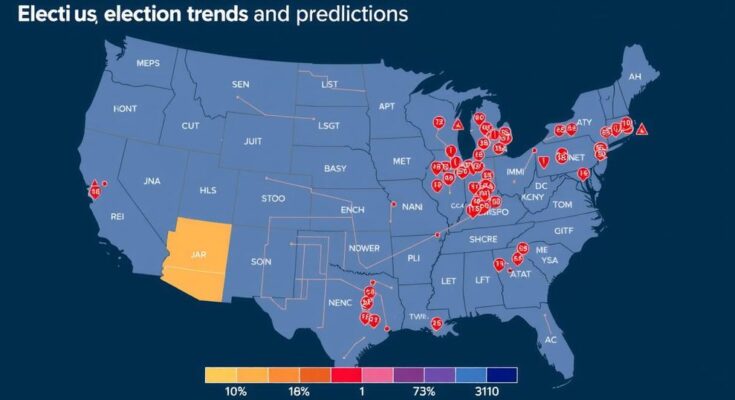The upcoming 2024 U.S. Presidential Election occurs amidst an international trend of anti-incumbent sentiment. While economic indicators suggest a strong U.S. economy, public dissatisfaction may lead to unpredictable election outcomes. With major polling uncertainties, both candidates have conveyed contrasting messages, while concerns about foreign interference exist. Ultimately, the election result will significantly impact both national and global landscapes.
As the United States approaches the 2024 Presidential Election, it finds itself amidst a tumultuous international trend where incumbents worldwide are facing significant electoral challenges. Countries such as the United Kingdom, Japan, South Africa, and several others have witnessed substantial changes in their political landscape, often leading to the defeat of those in power. This raises the question: Will the United States follow suit, or will it resist this anti-incumbent wave? Despite the circumstances prevailing in many of these nations, Vice President Kamala Harris stands to potentially overturn this trend in the U.S. The economy, which many voters identify as their primary concern, appears robust by several measures. Recent reports indicate a GDP growth of 2.8 percent and near-record low unemployment rates, suggesting a vibrant economic landscape. However, public sentiment tells a different story; many Americans express dissatisfaction with the current economic situation and indicate that the country is heading in the wrong direction. This dissonance plays a critical role in the election’s uncertain outcome, complicating forecasts for both Democrats and Republicans. Historical polling inaccuracies, as seen in the recent election cycles of 2016 and 2020, add to the unpredictability of voters’ decisions in the final stretch before the elections. Voter behavior may skew in favor of the challenger—Donald Trump—who seeks to secure a non-consecutive term, while Democratic fears center around the possibility of another surprise loss akin to the previous elections. The upcoming election remains too close to call, as the battleground states reveal polling numbers within margins of error, complicating the ability to forecast a clear Electoral College winner. As over 68 million Americans have already cast their ballots, officials caution against drawing premature conclusions regarding voter tendencies based on early voting demographics, as the composition of votes remains unclear. As for the candidates’ strategies, both Vice President Harris and former President Trump have made final appeals to voters, emphasizing contrasting visions for America’s future. Harris positions herself as a guardian of the middle class and a proponent of global leadership, while Trump touts a return to strength and stability, focusing on promises to protect American interests abroad and repair the economy. Concerns about foreign interference persist, with reported attempts to manipulate information and disrupt the voting process heightening the urgency surrounding the election. Ultimately, the 2024 Presidential Election will have far-reaching implications not just for the United States, but for global dynamics, making the eyes of the world keenly focused on the outcome. As such, it embodies a critical moment to ascertain whether the anti-incumbent sentiment that permeates global politics will influence American voters this November.
In recent elections around the world, incumbents from various nations have been ousted, drawing attention to a potential anti-incumbent trend. The article discusses this phenomenon and its implications for the upcoming U.S. Presidential Election. Given the significant economic indicators in the United States, contrary to the situations faced by incumbents abroad, the article explores the possibility that Vice President Kamala Harris might defy this trend. However, public sentiment reflects a disconnect with the statistical realities, introducing uncertainty into the election’s outcome. Through examining polling dynamics, predictions regarding voter behavior, and the strategies of both candidates, the piece outlines the complexities surrounding the 2024 elections amidst a backdrop of potential foreign interferences and shifting global perceptions.
As Election Day approaches, the United States remains at a critical juncture where the outcome remains unpredictable. Despite strong economic data, voter discontent looms large, potentially influencing the results significantly. The contrasting campaigns of Harris and Trump highlight stark differences in vision for the future of the nation and its place in global affairs. The implications of the election result extend beyond national borders, affecting international relations and policies. As such, the unfolding electoral events will be integral to defining the United States’ political trajectory in both the immediate and distant future.
Original Source: www.cfr.org




